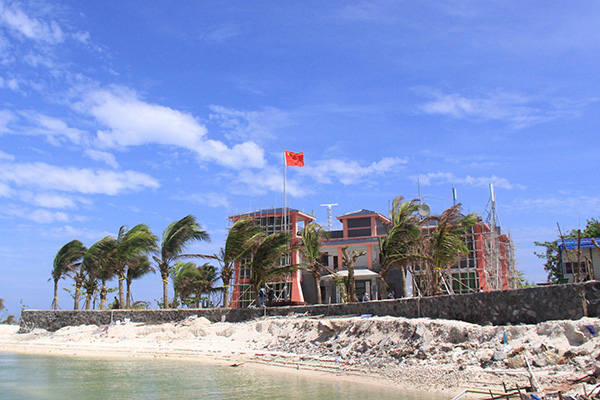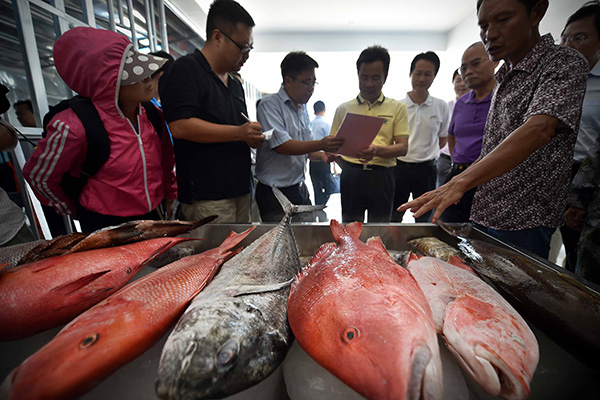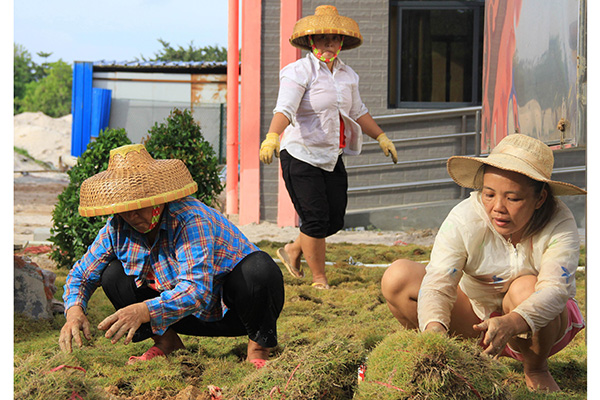
A government building under construction on Zhaoshu Island.[Photo/China Daily]
Yongxing Island has never offered as many business opportunities as it does today, according to Chen Hongwei.
Chen, a construction project manager for Hainan First Construction Engineering Co, said the company’s business has received a massive boost in the last three years as a result of an intense infrastructure drive in Sansha, founded in 2012.
Hainan First currently has a 50-person team employed on the construction of the island’s first primary school, but the limited transportation capabilities mean Chen’s biggest headache is simply getting new workers to the island, which is not open to the general public.
“The people who come to the island are mainly fishermen and their relatives, and government employees. It’s never easy to get a ticket for the boat,” said the Hunan province native, who has lived on the island for more than 20 years.
Sansha, which administers the island groups around Xisha, Zhongsha and Nansha and the surrounding waters in the South China Sea, celebrated its third birthday in late July. The local authorities are still trying to boost the young city’s transportation and infrastructure, and further improve its function as a center of government. A number of projects have also been launched to improve living conditions on Yongxing Island and the neighboring islets.
Chen estimated that the island-part of Hainan, China’s southernmost province-is currently home to more than 1,000 construction workers, equal to almost one-fifth of the resident population. The primary school in Sansha is scheduled to open in September, and the city is relocating all the residents of the island’s fishing villages to 19 residential complexes, some of which are still being built.
Xiao Jie, Sansha’s mayor, said the immature infrastructure, especially transportation, is one of the biggest factors hampering development. “There was no precedent to follow in either infrastructure construction or city governance. Everything we’ve done has been achieved through trial and error,” he said.
Every sandbag and brick used in the construction work has to be shipped from the mainland, and the buildings must be able to resist the frequent typhoons, Xiao told the two sessions, the meeting of China’s top governing bodies, in March.

Some relocated residents on Yongxing Island have opened a center offering leisure facilities and fresh seafood in their new community.[Photo/Xinhua]
Poor communications
The transportation of cargo and personnel between Sansha and the outside world relies on the newly built Sansha 1, a car and passenger ferry that makes the round trip to Haikou, the capital of Hainan, once a week. In calm weather, the voyage takes about 10 hours, but heavy swells and strong winds can often extend the journey time or confine the boat to port.
“The area of ocean near Xisha is frequently battered by strong winds that cause high tides, and the ship’s operations frequently have to be suspended during adverse weather conditions,” Xiao said.
In an attempt to improve communications and transportation, the authorities in Sansha are planning to launch regular flights to and from Yongxing Island, so the local freight airport is being expanded and upgraded to accommodate passenger aircraft, according to Xiao. He added that the city is also searching for opportunities offered by the 21st Century Maritime Silk Road initiative that has been proposed by the Chinese government.
“The hundreds of islets in Sansha can serve as platforms to provide services for trade and the maritime industries,” he said.
Chen, the construction manager, said all the islets should be opened to the public and market forces should play a greater role in the allocation of resources. Even though their limited resources mean the islets are unable to receive a large number of visitors, people who are willing to pay the high price to travel to them should be allowed to visit whenever they want, he said.

Workers lay turf on Yongxing Island on July 22 as part of local government measures to improve the environment.[Photo/China Daily]
A second home
Ancient records show that fishermen from Hainan first explored the waters around Yongxing Island during the Ming Dynasty (1368-1644), after Admiral Zheng He plotted the location. During the Qing Dynasty (1644-1911), a fleet of ships was sent to survey the area and erected a stele on one of the islands, firmly establishing them as a frontier for Chinese fishermen.
Chen Zefa lives with his father and younger brother in a poorly furnished wooden shack on Zhaoshu Island, which is part of the Xisha Island group. The men are part of a 200-strong contingent of fishermen from Tanmen, a township in Qionghai, Hainan, who live on the island for long periods every year, using it as a base for catching grouper and collecting marine produce such as oysters and large sea slugs.
Life on the island, about 2 nautical miles from Yongxing Island, has changed drastically in the three years since Sansha was founded. “At least tap water is available now, so we can take a bath after each fishing trip,” he said.
The 33-year-old fisherman sees the island as his second home because he lives there for about seven months of every year. Most of the fishermen on the island can dive to a depth of 4 to 5 meters without equipment, he said, adding, “We were born to be fishermen, and we survive only by fishing.”
However, fish stocks near the island have decreased over the years, and the fishermen are unable to venture farther out to sea because their small boats are unsuited to the open ocean. The weather is also a dominant factor, and the fleet is often confined to port when the seas are rough.
In response, many fishermen have taken part-time work offered by the authorities as part of government efforts to develop the islands. Zhang Xiangfang is primarily a fisherman, but he also drives motorboats to ferry government officials between the islands. “You need a bit of luck for fishing. Sometimes you can make more than 200 yuan ($32) on a single trip, but sometimes you barely break even, given the cost of fuel,” he said.
Cultural shortfalls
Sansha has already attracted a raft of private businesses eager to explore its maritime resources, according to the city government. As of July, nearly 100 companies had registered in the city, and the total registered capital was 1.12 billion yuan.
“You can see from the blue water and white sand that the marine ecology is still beyond comparison with any other coastal waters in China,” said Li Guangyi, deputy manager of Lanlifang Maritime Technology Co, which operates a number of pearl oyster hatcheries in the waters around Zhaoshu Island.
Li said Lanlifang Maritime chose Sansha largely because of local government measures designed to help businesses diversify their income channels. However, some other businesspeople said the authorities should make more efforts to attract more companies and talented individuals to the islands and encourage them to stay.
Yongxing Island has one commercial street, Beijing Road, which boasts a supermarket, a few restaurants, a coffee shop, a barbershop, banks and a post office.
“Compared with life in other places, the city suffers from severe shortages of material and cultural resources,” said Li Huadong, general manager of a barbeque restaurant on Beijing Road. The restaurant offers free movie screenings every night, and the large audiences they attract are evidence that life on the island can become monotonous, a factor that has dissuaded many businesses from making the move there.
“The city should try to showcase the local culture and make life on the island more interesting, rather than simply trying to improve the infrastructure. People need more things to do,” Li said.
Water, water everywhere ... at last

Wang Junning checks equipment at a desalination plant.[Photo/China Daily]
Although the government has implemented many measures to improve living conditions on the islands in the South China Sea, the conditions are still inhospitable-scorching sunshine, burning temperatures and humid, salt-laden air. For the residents, the biggest improvement has been the introduction of fresh water via a series of desalination plants that treat seawater.
“Even though some people choose not to drink the desalinated water, at least they can use it to bathe, do the laundry and for irrigation,” said Wang Junning, an engineer with Beijing Enterprise Water Group, which operates Sansha’s desalination projects.
Wang, a native of the Guangxi Zhuang autonomous region who has been building and operating desalination stations on the islands for three years, said his work gives him a genuine sense of achievement because the lack of fresh water was the biggest challenge facing the residents.
“In the old days, the fishermen would calculate the amount of water they could use for bathing based on the incoming weather they saw on their fishing expeditions. If they knew rain was on the way, they would use a barrelful, but if a dry stretch was expected they only used a ladleful,” he said. “At least they can bathe whenever they want now.”
Wang and 10 colleagues oversee the maintenance of desalination plants on four islands-Yagong, Zhaoshu, Beidao and Xishazhou. He said seasickness is an occupational hazard because he and his colleagues regularly hop between islands to inspect the equipment: “The waves are always high and our boat is always small. The journeys are never pleasant.”
After frequent visits to the islands, Wang is on familiar terms with all the residents, and often accepts offers to eat and sleep in their homes. Occasionally, he joins the fishermen on their trips to see how they catch the fish and to watch them dive for oysters and large sea snails.
“I know a little of their dialect, so communication isn’t a problem. They are nice people and they recognize the value of my work,” he said.
Even though solar power generators keep the residents supplied with electricity, life on the small islands-with the exception of Yongxing Island, where Sansha is located-is still far from comfortable.
“Food has to be refrigerated for 15 or 20 days until the next supply ship arrives. Some households don’t even have toilets, and most people live in wooden shacks that offer very little protection from either the heat or the typhoons. I’m proud that my work helps to improve their lives,” he said.
